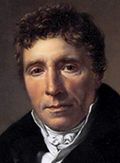 |
Emmanuel-Joseph Sieyès
b. 3 May 1748, Fréjus, Var
d. 20 Jun 1836, Paris |
| Title: |
Président de l'Assemblée nationale (President of the National Assembly) |
| Term: |
8 Jun 1790 - 21 Jun 1790 |
| Chronology: |
8 Jun 1790, election as president proclaimed by the National Assembly, session of the Assembly, Salle du Manège, Paris; assumed the chair immediately upon the proclamation of election [1, vol. XVI, p. 138] |
|
21 Jun 1790, expiration of term; successor elected and proclaimed [1, vol. XVI, p. 395] |
| Names/titles: |
Surname also spelled as: Siéyès; comte Sieyès, comte de l'Empire (count Sieyès, count of the Empire) [from 3 Jun 1808] |
|
Président de la Convention nationale (President of the National Convention) (20 Apr 1795 - 5 May 1795) [see details]; Membre du Directoire exécutif de la République française (Member of the Executive Directory of the French Republic) (20 May 1799 - 10 Nov 1799) [see details]; Président du Directoire exécutif de la République française (President of the Executive Directory of the French Republic) (19 Jun 1799 - 23 Sep 1799) [see details]; Consul de la République française (Consul of the French Republic) (10 Nov 1799 - 25 Dec 1799) [see details] |
| Biography: |
| Originated from a notary family of Fréjus; educated for an ecclesiastical career at the Doctrinaires' college in Draguignan; attended the seminaries of Saint-Sulpice (1765-1770) and Saint-Firmin (1770-1772) in Paris; was made a secretary to Jean-Baptiste-Joseph de Lubersac, bishop of Tréguier, Brittany (1775); accepted a canonry at Tréguier (1779); followed Lubersac who had been transferred to the bishopric of Chartres (1780); became a canon of the cathedral (1783) and chancellor of the diocese of Chartres (1788); appointed a commissioner at the Sovereign Chamber of Clergy of France (1787-1790); served as a member of provincial assembly of Orléans (1787); issued pamphlet Qu'est-ce que le tiers état? (1789), identifying the unprivileged Third Estate with the French nation; elected (19 May 1789) as a representative of the Third Estate by the constituency of Paris to the États-Généraux (Estates-General); was one of the initiators of declaring the Estates-General an assembly of representatives of the French people (15 Jun 1789); deputy of the Assemblée nationale (National Assembly) (1789-1791); served as President of the National Assembly (8 Jun 1790 - 21 Jun 1790); elected to Convention nationale (National Convention), representing the département of Sarthe (1792-1795); voted for the execution of King Louis XVI; served as a member of the Comité de salut public (Committee of Public Safety) (5 Mar 1795 - 3 Jul 1795, 2 Aug 1795 - 4 Nov 1795); elected President of the National Convention (20 Apr 1795 - 5 May 1795); elected (15 Oct 1795) to the Corps législatif by 19 départements, opted for Sarthe; selected for sitting in the Conseil des Cent-Cents (Council of Five Hundred); elected (1 Nov 1795) a member of the Directoire exécutif (Executive Directory), but declined (2 Nov 1795); survived an assassination attempt (12 Apr 1797); President of the Council of Five Hundred (21 Nov 1797 - 21 Dec 1797); appointed (10 May 1798) ambassador to the Kingdom of Prussia; elected a member of the Executive Directory for the second time (16 May 1799) to replace Jean-François Reubell; returned to Paris (7 Jun 1799) and assumed his seat (9 Jun 1799); served as President of the Directory (19 Jun 1799 - 23 Sep 1799); conspiring with Napoléon Bonaparte, helped organize the 18 Brumaire coup (9 Nov 1799 - 10 Nov 1799) that overthrew the Directory; appointed Consul of the Republic (10 Nov 1799 - 25 Dec 1799) along with Bonaparte and Pierre-Roger Ducos; drafted the Constitution of Year VIII; nominated member of the Sénat conservateur (ex officio as the outgoing consul according to Art. 24, Constitution of Year VIII, effective 25 Dec 1799); served as President of the Sénat conservateur (25 Dec 1799 - 25 Mar 1800); nominated grand officer of the Legion of Honour (14 Jun 1803), count of the empire (3 Jun 1808); nominated to the Chambre des pairs (Chamber of Peers) (2 Jun 1815) during the Cent-Jours (Hundred Days); banished as a regicide (1815) and did not return to France until 1830.
Biography source: [2] |
| |
| [1] |
Archives parlementaires. Série 1, |
| [2] |
Dictionnaire des parlementaires français 1789-1889, |

